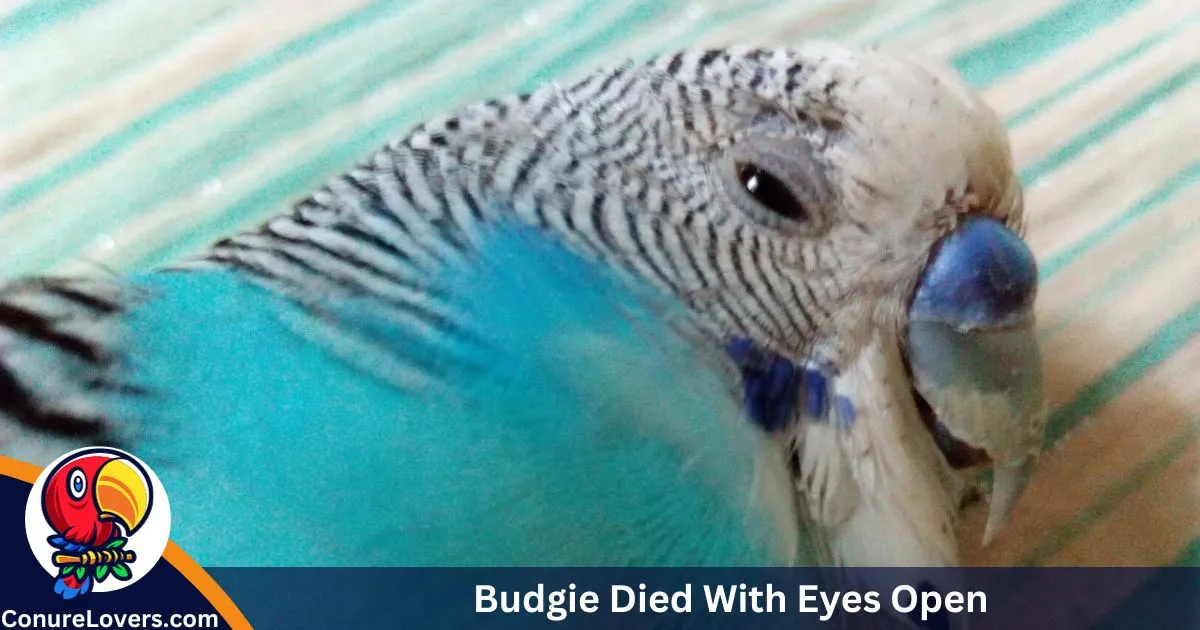If a budgie is looked at by a cat or hears sudden noises or sees reflections, it can get stressed out. This stress can make the budgie sick or even lead to its death.
Losing a budgie is really tough. It hurts a lot to say goodbye to a feathered friend you spent time with. No one should have to go through that.
Facing the loss is hard, but it’s important to know why your budgie passed with its eyes open. Finding out why gives you closure and helps you take better care of your next budgie. That’s what this article is all about, so keep reading.
Budgies passing away with eyes open isn’t rare. It can happen in the evening or early morning. Now, let’s talk about why this might occur.
Budgies don’t always show signs of feeling unwell, and only patient owners might notice. In this article, we’ll look closely at the common reasons for a budgie’s passing with open eyes. Stay tuned for simple insights into understanding and caring for your budgies.
13 Reasons Why It Happened
Understanding Budgies and the Factors That Can Lead to Unexpected Death
Budgies, although wonderful pets, are susceptible to various threats due to their fast metabolisms, small bodies, weak respiratory systems, and fragile immune systems. These factors make them more vulnerable to diseases and injuries compared to other pets.
1. Short Life Span:
Budgies have a lifespan of only 5-8 years, and the effects of aging start early for them. What might take decades to affect larger birds can strike budgies within a matter of years.
2. Rapid Metabolism:
Budgies have high-energy lives due to their rapid metabolisms. However, when illness strikes, their small bodies may succumb to it more quickly, leading to sudden and mysterious deaths.
3. Reaction to Stress (Hyper reaction):
Stress, triggered by events like being stared at by a cat or exposure to unexpected noises, can compromise budgies’ immune systems, potentially causing fatal heart attacks.
4. Vulnerable Respiratory System:
The respiratory system of budgies is sensitive, with many air sacs in their chests. Substances like mold, non-stick Teflon coatings, and air fresheners can hinder their ability to gather oxygen properly.
5. Hidden Sicknesses:
Budgies may not show signs of weakness when unwell, making it challenging for owners to detect seemingly insignificant health concerns that could escalate.
6. Panic in the Night:
Nighttime panic reactions can lead budgies to injure themselves by flying into cage bars or other objects. Providing a peaceful sleeping environment and avoiding disturbances can prevent such incidents.
7. Dehydration:
Budgies can go 24 hours without drinking water, and sudden dehydration is a common cause of mortality. Ensuring a fresh water supply and avoiding prolonged exposure to high temperatures are essential.
8. Exposure to High Temperatures:
Leaving budgies in the sun or hot environments can lead to heat stroke or sun sickness, causing lethargy and potential fatality.
9. Non-Stick Pans in the Kitchen:
Teflon coating on non-stick pans emits toxic fumes when heated, posing a serious threat to budgies’ respiratory health. Keeping birds out of the kitchen during cooking is crucial.
10. Poisoning by Lead and Heavy Metals:
Chewing on cage structures or exposure to items containing lead and heavy metals, such as toys and batteries, can lead to quick poisoning.
11. Infections:
Budgies can succumb to various infections, including viral, bacterial, and parasitic diseases. Maintaining cleanliness and a balanced diet is crucial for preventing infections.
12. Food Poisoning:
Young and curious budgies may peck at harmful substances, leading to food poisoning. Owners should be aware of toxic foods and provide a safe diet.
13. Cigarette and Tobacco Smoke:
Budgies are highly sensitive to cigarette smoke, which can be fatal. Inhalation of any type of smoke, even from a campfire, can lead to sudden death.
Additional Circumstances:
– Paralysis: Causes such as metal poisoning, exposure to scented candles or cleaners, cigarette smoke, and food poisoning can lead to sudden paralysis and death.
Understanding these factors can help budgie owners create a safe and healthy environment, reducing the risk of unexpected and unfortunate incidents.
Can budgies play dead?
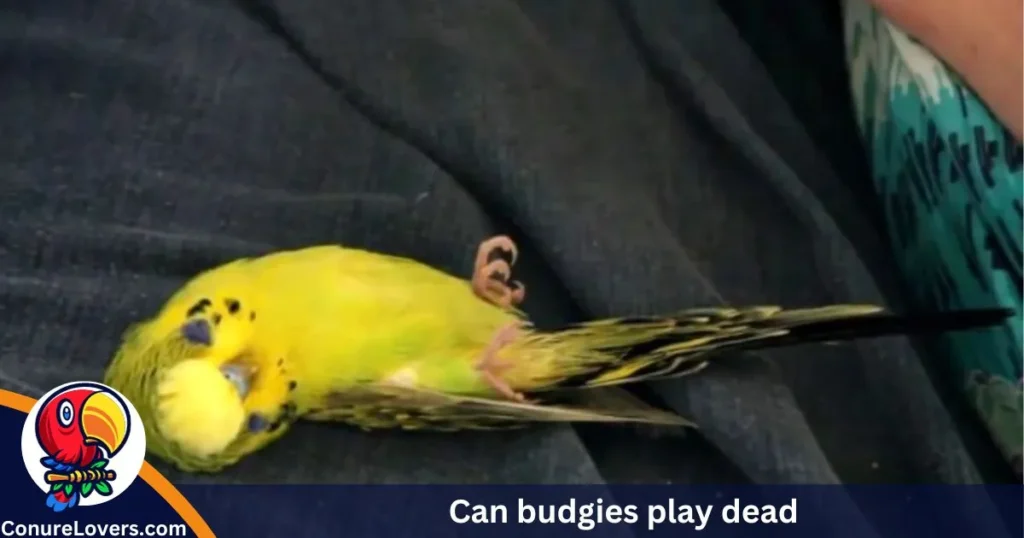
Yes, budgies can play dead, and it’s not just mischief; it’s a clever trick they use when they sense danger. This behavior is a survival tactic employed by birds and other prey animals to escape potential threats. If you catch your budgie playing dead, it’s essential to ensure there’s no real danger, like a lurking predator.
If there’s no sign of danger, your budgies might simply be in the mood for some playful antics. While it’s entertaining to witness, it’s crucial to stay vigilant about their overall well-being.
Even though they’re playing, it’s important to rule out any underlying health issues that may need attention. A visit to the vet can help ensure your feathered friends are in good health, giving you peace of mind. So, enjoy their playful performances, but also prioritize their health to keep the fun times rolling!
Do budgies die with their eyes open?
Certainly, it is indeed possible. Closing one’s eyes involves a conscious muscle contraction, which becomes impossible when a budgie is no longer alive. If a budgie didn’t close its eyes before passing away, it’s likely that they remained open. Alternatively, the eyes might open later if the muscles cease to function. The timing of eye closure or opening can provide insights into the moment of passing, reflecting the intricacies of the body’s processes during this natural event.
Why would a budgie die suddenly?
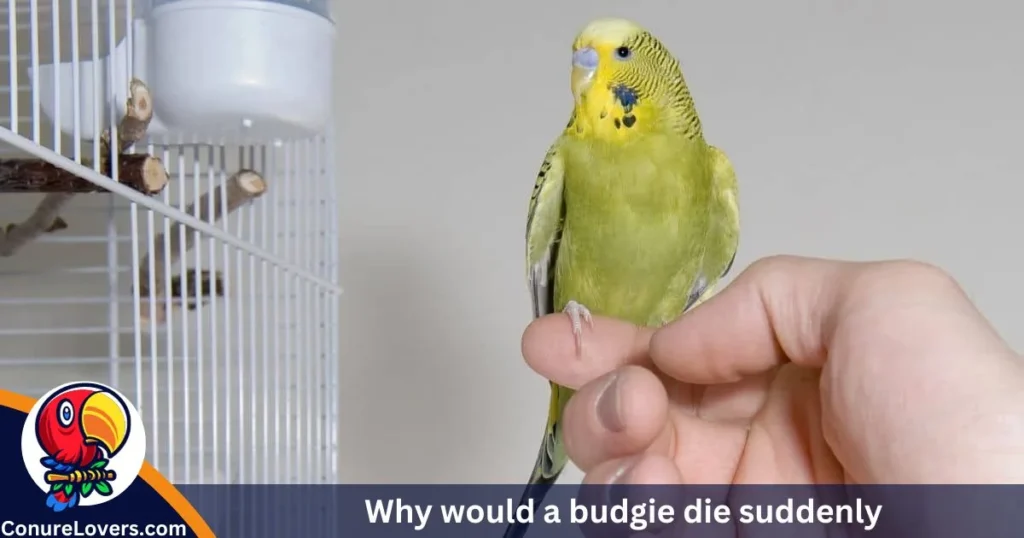
The unexpected death of a parakeet can happen for different reasons, and it’s essential to know them to keep our feathered friends safe. Here are some common factors:
1. Disease: Sickness can quickly take a toll on a parakeet’s health. Regular check-ups with a vet and maintaining a clean living environment help prevent potential diseases.
2. Accidental Poisoning: Parakeets might ingest harmful substances accidentally. Keep an eye on their surroundings, ensuring there are no toxic materials within their reach.
3. Poor Nutrition: A balanced diet is crucial for a parakeet’s well-being. Providing a variety of nutritious foods ensures they get the essential nutrients for a healthy life.
4. Heat Stroke: These little birds can be sensitive to high temperatures. Avoid exposing them to excessive heat, and always ensure they have access to shade and water.
5. Fear of the Dark at Night: Parakeets can get scared during the night, leading to stress and potential health issues. Creating a calm sleeping environment with minimal disturbances helps prevent nighttime fear.
Taking these precautions and staying attentive to your parakeet’s well-being can significantly reduce the risk of sudden demise. Regular care and a watchful eye contribute to a happy and healthy life for your feathered companion.
What does a dying budgie look like?
If your budgie is infected with a contagious condition, it may succumb rapidly and become unresponsive. Various infections, whether viral, bacterial, or parasitic, can manifest with noticeable signs of illness in the days leading up to its passing. Keep an eye out for these indicators:
1. Heavy Breathing: Labored or heavy breathing is a clear sign of respiratory distress in your budgie.
2. Reduced Activity: A sudden decrease in your budgie’s usual activity level may indicate an underlying health issue.
3. Messy Feathers: Noticeably unkempt or messy feathers can be a sign of distress or illness in your feathered friend.
4. Reduced Appetite: A loss of interest in food or a decreased appetite could be a symptom of an infection affecting your budgie’s overall well-being.
5. Mouth Foaming: Foaming around the mouth is an unusual and concerning sign that may suggest respiratory or other health problems in your budgie.
If you observe these symptoms, it’s crucial to seek prompt veterinary attention to diagnose the specific infection and implement appropriate treatment measures. Early detection and intervention increase the chances of a positive outcome for your budgie’s health.
Can Budgies Die of Loneliness?
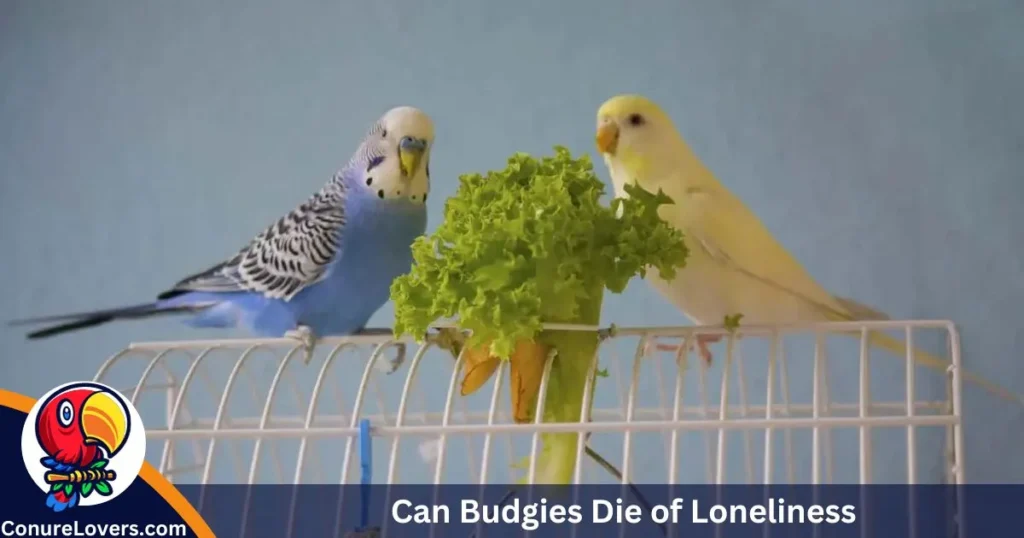
You don’t have to wait for weeks to figure out if your budgie is feeling lonely—it’s quite easy to notice. Budgies are super friendly and cuddly, a bit like quaker parrots, so you’ll see it when they’re lonely.
These little birds love company and get sad if they don’t have enough fun or hang out with you or other budgies. Loneliness can lead to boredom and emotional ups and downs, and while it won’t make your budgie kick the bucket, it can stress them out.
Now, stress isn’t good for a budgie. It messes with their eating, drinking, and playing. It can even cause serious stuff like malnutrition, weak muscles, and damage to their organs. Over time, all this stress and boredom might make your budgie sick. The tricky part is, budgies are champs at hiding when they’re not feeling well.
Although loneliness isn’t the most common reason budgies say bye-bye, it can definitely shorten their happy birdie life. So, if your budgie suddenly goes, “tweet, tweet” less often, seems a bit off, or looks like they’re not eating well, loneliness could be playing a part.
Making sure your budgie has fun things to do and hangs out with buddies (maybe even you!) helps keep them happy and healthy. After all, a chirpy budgie is a happy budgie!
Read Also: Can Conures Have Bananas
Can budgies have a heart attack?
Pet birds, especially those with longer life spans, can face heart problems similar to humans. Conditions like atherosclerosis (hardening of the arteries), heart attacks, and high cholesterol are potential issues.
Keeping an eye on your bird’s cardiovascular health is essential. Regular vet check-ups and a balanced diet play a crucial role in promoting a longer and healthier life for your feathered companion. Just like we look after our own hearts, taking preventive measures ensures a happier and more active life for our pet birds.
Why are my budgies not moving? Are they dead?
If your budgie is having trouble moving around, it could be a sign of a problem called avian paralysis. It means your budgie might not be able to shift its body or lift its neck properly. In such situations, you might notice only the tail moving up and down as the budgie struggles to breathe.
It’s super important to act quickly and get your budgie to the vet because waiting can be really bad, even leading to the bird not making it. So, if you see your budgie having a tough time moving, don’t wait—get them the help they need fast!
What happens when budgies die?
If your budgie is dealing with an infectious condition, it might pass away swiftly and seem unresponsive. Infections can be viral, bacterial, or parasitic, and your budgie might show signs of being sick in the days leading up to its passing. Keep an eye out for these signs:
1. Heavy Breathing: If your budgie is breathing heavily, it could be a sign of respiratory distress.
2. Reduced Activity: A sudden drop in your budgie’s usual activity level might indicate an underlying health issue.
3. Messy Feathers: If you notice your budgie’s feathers looking unkempt or messy, it could be a sign of distress or illness.
If you observe any of these symptoms, it’s crucial to seek veterinary attention promptly. Early detection and appropriate care can make a significant difference in your budgie’s health and well-being.
Parakeet died after a week- WHY?
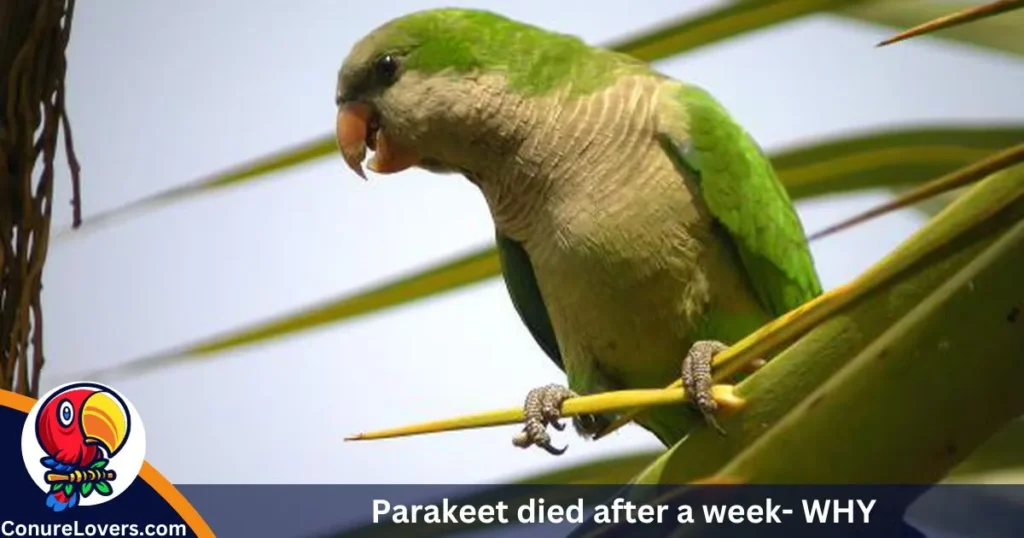
Sometimes, a parakeet can suddenly pass away because of things like sickness, accidental poisoning, not-so-good food, getting too hot, or being scared of the dark at night. But, there are ways to stop it from happening.
Taking care of your parakeet’s home, giving them healthy meals, and keeping an eye out for any signs of not feeling well can make a big difference. By doing these things, you can help keep your feathered friend happy and healthy for a longer time.
If a bird is stiff is it dead?
Yes, or it could be a case of paralysis. If your budgie can’t move, it might be avian paralysis, but reduced movement could also mean it’s feeling weak. In avian paralysis, the budgie may not be able to shift its body or lift its neck. You might notice only the tail moving up and down as the bird has a hard time breathing. It’s crucial to act fast and get treatment because waiting could lead to serious consequences, even death. Early treatment is key to helping your budgie recover.
My budgie died what should I do?
If your pet passes away and you want to know why, you can take it to a vet for a closer look. This helps figure out what happened and how to stop it from occurring again in the future. Getting more information from the vet helps you take better care of your pets and keeps them healthy and happy.
Conclusion
It’s pretty normal for budgies to have sudden and unexplained deaths. To give your budgie the best chance, make sure its cage is clean, keep an eye on the temperature, and give it good, healthy food and water.
Did you find these tips helpful? Share them with your friends!

Nicholas Clark here, your Easy Conure Care Guide at “Conure Lovers.” I’m here to simplify conure care for you. Let’s navigate the basics together, ensuring your feathery friend enjoys a colorful and chirpy life.

